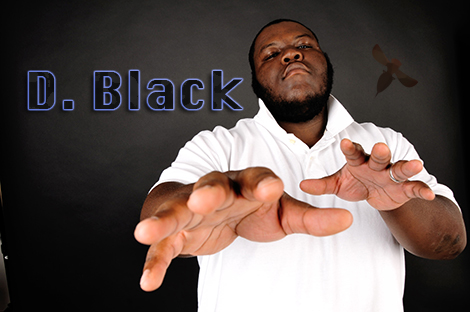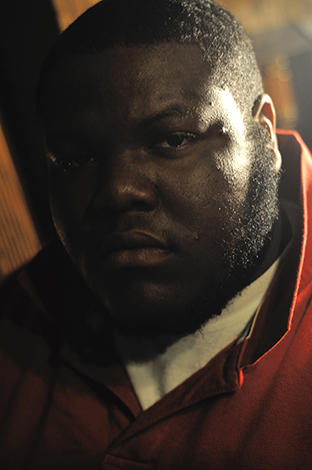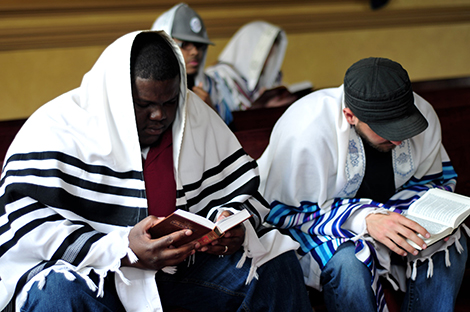
D. Black came up in a musical family. Both his mother and father were member of the Emerald Street Boys and Girls, Seattle’s first Hip Hop crew. The music took permanent residence in D. Black’s heart, and at the young age of 14, he went under the guidance of Seattle’s Vitamin D. and later Jake One. When asked about his relationship with D. Black, Jake One, who featured D. Black on his own LP White Van Music, describes D as his little brother that he didn’t necessarily want to listen to who then became the little brother who couldn’t be ignored. Any reluctance Jake had about putting D. Black on the album quickly disappeared after DJ Premier and others would ask the Seattle beatsmith, ‘yo, who is that kid on the track “God Like”.
With last month’s release of his sophomore album, Ali’ Yah, Damien Black caught our attention as well. The album’s title is Hebrew for “ascend”, and as Jews know, and Black explains, the word “is used when a Jew migrates back to the Holy land (Jerusalem) or when one is called up to read from the Torah,” he tells us. “In a sense they are ascending to commit a very Holy act, both in the physical and spiritual…Ali’Yah is a reflection of my heart and nature just as the “Torah” is a reflection of G-d’s Heart and essence.” Our own Ashydakid goes heart to heart with D. Black in this week’s edition of RH First Look. Check it out below.
D. Black: “The Return”
[audio: http://rubyhornet.com/media/rh/music/d_black_the_return_prod_by_jake_one.mp3|width=180]RubyHornet: So your sophomore album, Ali’Yah, just dropped last month. How has the fan response been for this album in comparison to your first project, The Cause & Effect. And have you chosen to take a different approach in terms of the leaking of tracks and promotion in general?
D.Black: The response has been great. I actually have to say I’m shocked by how good the response has been. I chose to take a different approach with the music because I have become a different person. It would be merely impossible for me to re-create a record like The Cause & Effect. [I am] A new man with a new perspective.
RubyHornet: I read that you are a firm believer in the Messianic Hebrew roots of Christianity. With Ali’Yah meaning to “ascend” in Hebrew, does this tie in any way with your choice of the title and concept for the album? And if so how?
D.Black: To clarify my faith, I am a non-Jew that believes in and practices Judaism. It’s been said different so many times that nobody knows what to call it. It’s called a Judaist. The term “Ali’Yah” is used when a Jew migrates back to the Holy land (Jerusalem) or when one is called up to read from the Torah. In a sense they are ascending to commit a very Holy act, both in the physical and spiritual. I called this record Ali’Yah because I am ascending into a realm or space of Holiness (spiritually). It’s as if I went to the Holy land, and found peace in doing so. I get to share a piece of my Torah. Ali’Yah is a reflection of my heart and nature just as the “Torah” is a reflection of G-d’s Heart and essence.
RubyHornet: Many artists, and just many people these days like to describe themselves as spiritual but not necessarily practitioners of any specific religion…Where do you stand on the idea of being spiritual but not disciplined to a specific religion?
D.Black: I don’t think it’s about where I stand, but rather where the Divine stands. I don’t think it’s healthy honestly, but I understand. Most people I know who use that phrase “spiritual” have been hurt by religion all together, they have been scarred by it, and sadly, some never heal. It’s really unfortunate, not just for people in my faith in particular. I see artists who are religious at their core, like Freeway, and I even wish he’d tap in deeper to his religion (Islam) like his heart wants too. The term “spiritual” bothers me a bit. Like really, what does that mean? It always leads into a deeper conversation with me of course!
RubyHornet: You’re coming from Seattle, Washington, which is a West Coast state. As far from Cali that you are, you are still considered a West Coast artist. But from listening to your music it doesn’t seem to fall in the category of your typical West Coast music. Is this one of those things that can be said about the city of Seattle as a whole as far as Hip Hop goes?
D.Black: Seattle makes all kinds of Hip Hop. We were known for the underground soulful sound more in the 90’s. I think that later evolved into the softer, smoother, socially aware sound that Blue Scholars are making noise with. We move in so many directions it’s hard to pin one specific sound on us.

RubyHornet: Both of your parents were a part of The Emerald Street Boys and The Emerald Street Girls, which was a Hip Hop group in Seattle back in the 80’s. So I think it’s pretty safe to say that you are a product of a deeply rooted Hip Hop family. At any point in your childhood did you ever get the feeling of being forced to do music? Sort of like a dad who’s attempting to live his football dreams through his son?
D.Black: Not at all. It was in me from birth. I’ve always had the support of my parents, but I wasn’t forced. This was my dream!
RubyHornet: I read that you got probably one of the best birthday gifts an artist could ever get, which was being given part ownership of Sportin’ Life Records. Around what age were you when this gift was given to you from your father, and how have you managed the responsibility of part ownership of a record label?
D.Black: I was 18 when I was given part ownership. It worked out best because it was my “thing” not my Dad’s. My business partner DeVon Manier and I were more on the same page. Same vision and aspirations. We have managed really well mainly due to him and his hard work. He’s really the one who keeps us going as strong. I’d like to think I help out a bit. But, what I do is seen and heard, he goes unnoticed to the public, but he’s well deserving of the praise.
RubyHornet: Many people really got a first listen to you on Jake One’s album, White Van Music, on a track called “God Like”. How did you guys get linked up in order for you to be featured on that track? How did the concept of that song come about?
D.Black: I met Jake One (Ya’ak Echad is what I call him) through Vitamin D when I was about 14 or 15. Vita and Jake are close, so with my being under the mentorship of Vitamin D, Jake also became like a big brother. “God Like” was actually done a year and half, almost 2 years before the release of Jake’s record. It was something I knew would be heard on the national stage, so I went in with that in mind. My inspiration came from just wanting to be heard along with established artists. It was such an honor and privilege.
RubyHornet: On your first single, “Yesterday”, off of the new album you said, “That’s what they say to you, cuz if the music shapes who we are, then watch what they play to you.” This line can be broken down on many levels. These days many listeners, kids in particular, listen to the music and emulate many of the things that rappers talk about. Do you feel that rappers and artists in general hold a certain level of responsibility for the things they say in their music? And do you feel that Hip Hop in particular has a lot to do with the happenings of teen violence that we have been seeing in many urban cities these days, especially Chicago?
D.Black: Absolutely. We as rappers and Hip Hop fans need to start stepping up and taking responsibility for what we say, do, and promote. It’s easy math. It’s almost as if we are all living in denial on purpose, while defending our lack of honesty. At the end of the day we point our fingers at everyone but ourselves and I’m sick of it. It makes me angry just speaking about it, but I have to control myself because it wasn’t too long ago when I couldn’t see how destructive it is. I just pray their eyes be opened as well.
RubyHornet: What can the world expect from D.Black in the near feature in terms of mixtapes, features, and shows?
D.Black: More shows, we’re trying to hit the road, get out and make some more noise. I have an EP with B.Brown that should be ready to go soon. Other than that, I’ll be being a father, husband, davening, working, taking care of Home, at Shul remaining peaceful.
Rubyhornet: Here at RH we like to ask the artists who are under our First Look microscope for 3 reason why our readers should seek out more music and information about them. So the spotlight’s on you. Give us three reasons.
D.Black: It’s real. It’s needed. It can be played anywhere.

